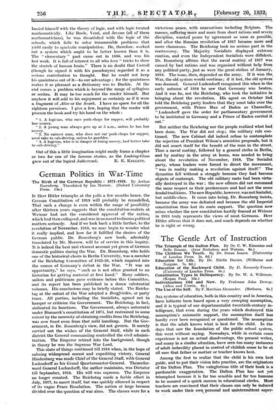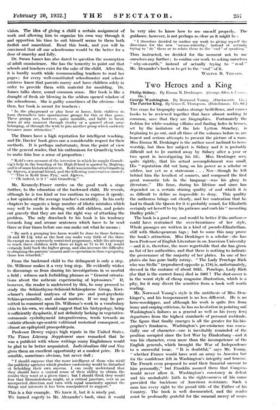The Gentle Art of Instruction
The Triumph of the Dalton Plan. By Dr. C. W. Kimmins and
Belle Rennie. (Ivor Nicholson and Watson. 63.) • Education for Life. By Dr. Neale Davies. (Williams and Norgate. 7a. 6d.) •
Constitution Types in Delinquency. By Dr. W. A_ Willemse. (Kagan Paul. 15a.) The Use of the Self. By F. Matthias Alexander. (Methuen. 6s.
Aix systems of. education, both in.this country and in America, have hitherto been based upon a very sweeping assumption, and it is typical of our departmentalist twentieth-century in- telligence, that even during the years -which destroyed this assumption's axiomatic support, the assumption itself has hardly ever been recognized or questioned. The assumption is that the adult knows what is best tor the child. In the days that saw the foundation of the public school system, this went without saying. Nowadays, while in certain cases experience is not an actual disadvantage, the present writer, and many in a similar situation, have seen too many instances of adult imbecility placed in control of childish sense to be at all sure that father or mother or teacher knows best.
Among the first to realize that the child is his own best guide, and to put their vision into practice, arc the originators of the Dalton Plan. The vainglorious title of their book is a pardonable exaggeration. The Dalton Plan has not yet triumphed because it is far too sensible and far too humane to be assured of a quick success in educational circles. Most teachers are convinced that their classes can only be induced to work under their own personal and unintermittent super-
vision. The idea of giving a child a certain assignment of work and allowing him to organize his own way through it and apportion his time to suit himself seems to them both foolish and anarchical. Read this hook, and you will be convinced that all our schoolrooms would be the better for a dose of anarchy and folly.
. Dr. Susan Isaacs has also dared to question the assumption of adult omniscience. She has the temerity to point out that schools and teachers exist for the sake of the child. After this, it is hardly worth while recommending teachers to read her pages ; for every well-constituted -schoolmaster and school- mistress know that parents many and have children solely in -order to provide them with material for moulding. Dr. Isaacs talks sheer, sound common sense. Iler book is like si draught of fresh air blowing in the seldom opened window of the schoolroom. She is guilty sometimes of the obvious—but then, her book is meant for teachers :
" In the playground or play hour at home, little children do form themselves into spontaneous groups for this or that game. These groups are, however, quite unstable, and liable to break down at any moment through rivalry or a quarrel about some belonging, or through the wish to join another group which suddenly becomes more attractive."
The Danes have a high reputation for intelligent teaching, and Dr. Davies' book gives one a considerable respect for their methods. It is perhaps unfortunate, from the point of view of the general reader, that his enthusiasm for Qrundtvig tends to make him lose a sense of proportion :
" Kohl's own account of the interview in which ho sought Grundt- vig's help In the founding of his High-School is quoted by Begtrup, and is of some historical interest. Kold was introduced to Grundtvig by Algreen, a mutual friend, and the following conversation ensued " ' This is Kold from Fyn,' said Algreen.
• ` `Oh indeed, is it ? ' said Grundtvig.'
Mr. Kennedy-Fraser carries on the good work a stage further, to the education of the backward child. He reveals, although lie is too kind or too cautious to express it openly; a low opinion of the average teacher's mentality. In his early chapters he suggests a large number of idiotic mistakes which may well be made in dealing with dull children, and points out gravely that they are not the right way of attacking the problem. The only drawback to his book is his tendency towards long and arcane sentences which have to be read three or four times before one can make out what he means : " By such a grouping less harm would be done to those between 50 and 60 I.Q. who at the best can make very little of the three Its except on an extremely restricted program:no, while the attempt to teach these children with those as high as 75 to 85 I.Q. would certainly hold back the higher group, and also increase the difficulty in obtaining the parents' consent and co-operation in thus segregating those less retarded.'
From the backward child to the delinquent is only a step. Dr. Willemse makes it a very long step. He evidently wishes to discourage us from sharing his investigations in so morbid a field : witness such forbidding phrases as " General orienta- tions about the asthenie experiencing of leptosomes." If, however, the reader is undeterred by this, he may proceed to study the SchizothymeSchiioid-Schizophrene Group, Kret- schrner's classical analyses of the pre- and post-psychotic Schizo-personality, and similar matters. If we may be per- mitted to comment upon Dr. Willemse's work in a vocabulary akin to his own, we should suggest that his biotypology, being ir sufficiently dysplastie, if not definitely lacking in vegetative- autonomic cyclothymoid integrativeness, tends towards an autistic sthenic ego-centric volitional motorical consequent, or almost an epileptoid prosopoblepsia.
Professor Dewey enjoys high repute in the United States. The Times Literary Supplement once remarked that he was a publicist with whose writings many Englishmen would be glad to be better acquainted. Individualism Old and New gives them an excellent opportunity at a modest price. He is sensible, sometimes obvious, but never dull : " I should suppose that the more intelligent of those who wield the publicity agencies which produce conformity would bo disturbed at beholding their own success. I can easily understand that they should have a cynical sense of their ability to obtain the results they want at a given time ; but I should think they would fear that likemindedness might, at a critical juncture, veer in an unexpected_ direction and turn with equal unaniinity against the
things and interests it lths been Manipulated 'to support." . .
This ia alkir example. We knew it but it is nicely put.
We turned eagerly to Mr. Alexander's book, since it would be very nice to know how to use oneself properly. • The guidance, however, is not perhaps as clear as it might be :
" I therefore decided to- confine my work to giving myself the directions for the new means-whereby,' instead of actually. trying to ' do' them or to relate them to the ' end' swaking."
Thus instructed, we decided for the moment not to use ourselves any further ; to confine our work to asking ourselves " why-on-earth," instead of actually trying to " read " Mr. Alexander's book or to get to the "end" of it.
WALTER. B. TIY.7...111).







































 Previous page
Previous page